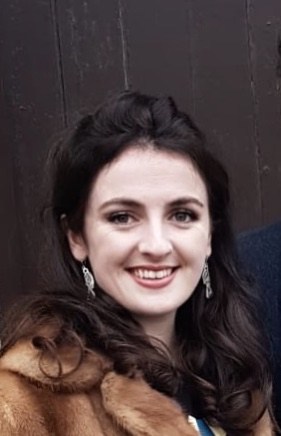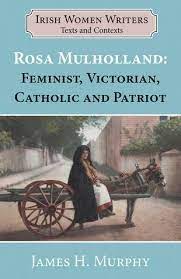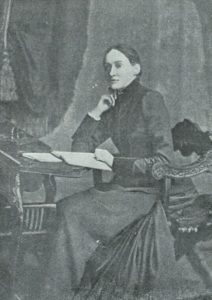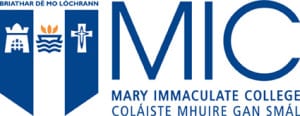Remembering Eavan Boland – Open Letter
This is a copy of an open letter addressed to Professor Linda Doyle, Provost of Trinity College Dublin on the subject of memorialising the poet Eavan Boland (1944-2020) from the RASCAL website.
The letter and it’s list of signatories (as of December 16th, 2021) are reproduced here. For updates please check the RASCAL website.
It appeared in The Irish Times December 11th, 2021.
Read More
Emerging Voices 4: Isobel Sigley

Isobel Sigley is currently undertaking a research studentship at Loughborough University, supervised by Dr Sarah Parker and Dr Claire O’Callaghan. Her research considers women’s short fiction from the late nineteenth century through to the early twentieth century and explores the ways in which touch, or the haptic senses more broadly, serves the politicised agendas of the ‘New Woman’ movement. She investigates the affinity between the active and agentic sense of touch and the search for agency and emancipation for late-Victorian women in literature. The Irish ‘New Woman’ authors George Egerton and Sarah Grand feature centrally in this research.
Read MoreEmerging Voices 3: Tara Giddens

Tara Giddens’ PhD project, ‘Investigating the Irish New Woman: Journalists in Media and Fiction’, offers exciting new research into Irish women’s contributions to popular culture and journalism. Focusing on the journalistic and literary careers of Kathleen Coleman, Charlotte O’Conor Eccles and L. T. Meade, her doctoral work was supervised by Dr Tina O’Toole and supported by an Arts, Humanities, and Social Sciences PhD Teaching Fellowship at the University of Limerick.
Read MoreThe Dreamwork of a Nation: From Virginia Woolf to Elizabeth Bowen to Mary Lavin
Patricia Laurence
For a more detailed reading of this subject matter, see Laurence’s chapter ‘The Dreamwork of a Nation: From Virginia Woolf to Elizabeth Bowen to Mary Lavin’ in ‘The Edinburgh Companion to Virginia Woolf and Contemporary Global Literature (2021), Edited by Jeanne Dubino, Paulina Pająk, Catherine W. Hollis, Celiese Lypka, Vara Neverow.
Too often women writers are viewed by critics and scholars as single subjects immersed in the culture and politics of a nation or their times. If we explore a comparative methodology of ‘shared affinities’ and consider and interpret them in national or international networks and pairings (as the IWWN September forum encouraged) we bring new aspects of their lives and new readings into view. Discovering shared affinities sometimes relieves authors of overworked cultural, political and critical positions in which they are stuck in their own contexts and cultures. Engaged in their own writing and experiments in different circles, classes, times or different parts of the globe, they may be unaware of each other. Nevertheless, placing them side by side on a broader global canvas will illuminate cultural and aesthetic refractions. Abandoning the overworked literary category of ‘influence’, I would argue, usefully repositions British and Irish women writers of different generations on a broader canvas.
Read MoreEmerging Voices 2: Shirley-Anne Godfrey

Shirley-Anne Godfrey is an emerging Irish playwright, currently researching how drama and theatre can be used as methodologies in rehabilitating the literary legacies of Lady Augusta Gregory (1852-1932) and Frances Browne (1816-1879) for her PhD at NUI Galway. Funded by the Irish Research Council, Godfrey’s research findings have recently been published in a chapter on “Lady Gregory’s Grania (1912): Myth and Mythology” in David Clare, Fiona McDonagh, and Justine Nakase’s The Golden Thread: Irish Women Playwrights (Liverpool University Press, 2021). Based on her research into Browne, a prolific Donegal poet, novelist, and essayist, Godfrey has written a play titled In My Mind’s Eye, which was chosen for the Lyric Theatre Belfast’s New Playwright’s Programme 2018/2019. The play has had rehearsed readings at the Lyric Theatre as well as at the American Irish Historical Society.
Read MoreRosa Mulholland republished on the centenary of her death
James H. Murphy
Rosa Mulholland, Lady Gilbert (1841-1921), died in the spring of 1921. Spring 2021, the centenary of her death, marks the publication of Rosa Mulholland: Feminist, Victorian, Catholic and Patriot, published by Edward Everett Root and edited by James H. Murphy. This reader of Mulholland’s work is part of the Irish Women Writers: Texts and Contexts series, whose editors are Kathryn Laing and Sinead Mooney, co-founders of the Irish Women’s Writing Network 1880-1920. The book consists of an introduction and bibliography of Mulholland’s work, and seven selections from her work. These have been chosen on the basis of their status as significant interventions into various issues of importance and also for being illustrative of the variety of topics she addressed at different points in her career.
Read MoreEmerging Voices 1: Nora Moroney


Nora Moroney
Nora Moroney has a research specialism in Irish literary cultures and their influence on and connection with the late-Victorian British periodical press. Her publications to date include articles on Irish women journalists in the Victorian Periodicals Review, focusing particularly on the writings of Alice Stopford Green and Charlotte Grace O’Brien, and on Belfast newspapers in The Edinburgh History of the British and Irish Press, Volume 3. Funded by the Irish Research Council Enterprise Partnership Scheme, she is currently conducting research into ‘The Benjamin Iveagh Library: A Cultural History of Collecting in Twentieth-Century Ireland’, a project that focuses on a private book collection based at Dublin’s Farmleigh House in Phoenix Park. Prior to her IRC postdoc, Moroney held a research post in the Manuscript Department of the National Library of Ireland where she worked on collections of nineteenth-century estate papers and twentieth-century literary archives.
Read MoreFrom Bushy Park to Elsinore: Noëlle Ffrench Davies
Mary Turley-McGrath
In January 1924, a young Irish woman arrived in Denmark to take up her position as a lecturer in the International People’s College in Elsinore. Born into a wealthy farming background in Co. Roscommon, she could have opted for a leisurely life. However, her dynamic spirit and determined personality set her on a diverse and exciting path. She had an ambition: to learn about the Danish Folk High-School system and to establish a similar one in Ireland.
Read MoreResearch Pioneers 13: Kathryn Laing
Kathryn Laing has a career-long research expertise in women’s writing and Irish women’s writing in particular. Her wide-ranging publications focus on the works of Hannah Lynch, Rebecca West, Virginia Woolf, and Edna O’Brien. Together with Faith Binckes, she’s co-written the study Hannah Lynch, 1859-1904: Irish writer, Cosmopolitan, New Woman (2019), and, with Sinéad Mooney co-edited Irish Women Writers at the Turn of the Twentieth Century: Alternative Histories, New Narratives (2020). You can read the introduction to that volume here.
Her service to the field most recently bore fruit in the co-founding of the Irish Women Writers Network 1880-1920 that has the ambitious aims of bringing together scholars with common research interests, providing a virtual platform that offers research and teaching resources, and making the latest research findings accessible to students in the form of a new network-associated series of full-length works issued through EER publishing.
Read MoreAway with the Fairies: Irish Folklore and Fin-De-Siècle Motherhood in Katharine Tynan’s Ballads and Lyrics (1891)
Sadbh Kellett, University of St. Andrews
The Irish writer Katharine Tynan was remarkable in her personal and literary embodiment of the ‘New Woman’. An educated member of Dublin’s Catholic middle-class, Tynan’s formidable literary career resulted in her financial independence, which she maintained alongside her nationalist political activism, all the while playing the part of dedicated wife and mother. As Aurelia L.S. Annat suggests:
Read More



